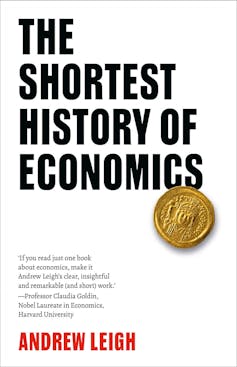From micro to macro, Andrew Leigh’s accessible history covers the economic essentials – and an epic rap battle
- Written by John Quiggin, Professor, School of Economics, The University of Queensland

Andrew Leigh’s The Shortest History of Economics[1] is the latest in a series of such histories, mostly focused on particular countries.
It begins with a striking mini-history of household lighting, focusing on the amount of labour required to produce the light now given off by a standard lightbulb: 58 hours for a wood fire, five hours for a candle based on animal fat, a few minutes for an early electric lightbulb, and less than one second for a modern light-emitting diode.
The Shortest History of Economics – Andrew Leigh (Black Inc.)
Importantly, what is true of labour hours is also true of material inputs. Older technologies required felling a tree or killing an animal, but an LED uses the photoelectric properties of common crystals. It only needs tiny quantities. The input of electricity is similarly modest.
Meanwhile, because workers in all kinds of activities have become more productive, the purchasing power of their wages, expressed in terms of services like lighting, has risen. The result is that services like lighting have become exceptionally cheap.
As this example shows, The Shortest History of Economics is not, as might be supposed, a history of economic thought (a topic primarily suited to retired economists like the author of this review). Rather, it is primarily a history of economic life, from Paleolithic times to the COVID pandemic.
The history is, however, informed by modern economics, included in the narrative in palatable doses.

















